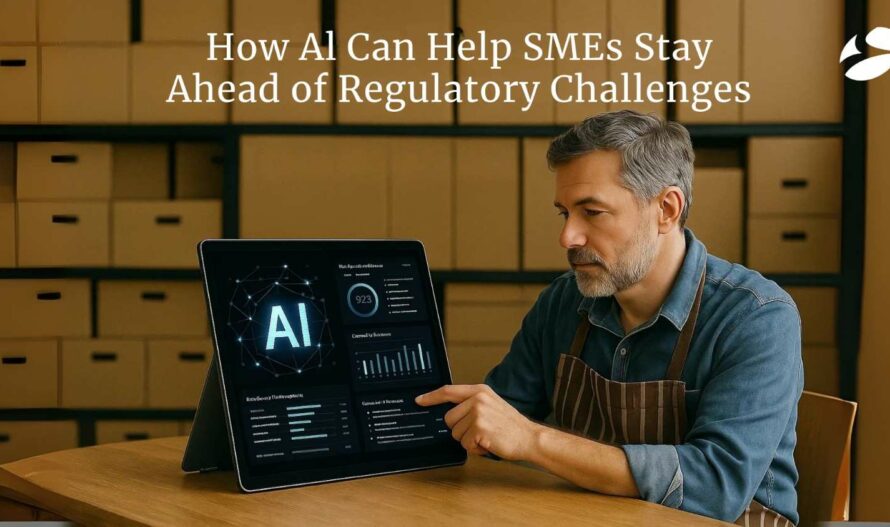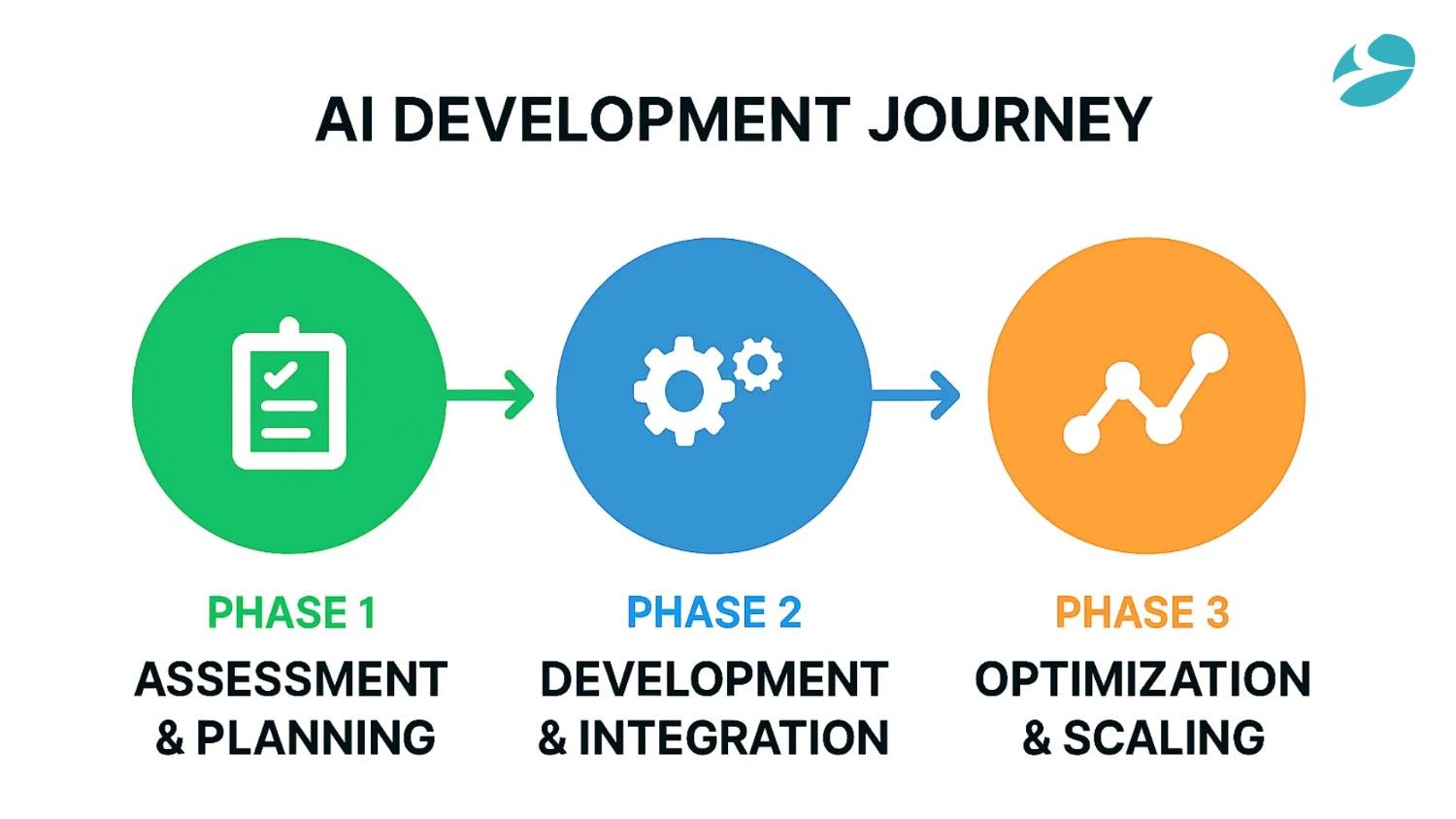Real-Time Compliance: How AI Can Help SMEs Stay Ahead of Regulatory Challenges
5 min read
5 min read

Do you know that according to the World Bank, SMEs account for approximately 90% of businesses and generate more than 50% of global employment? These small and medium enterprises are silently powering our global economy.
Unlike MNCs and large-scale enterprises, SMEs run on people, not just processes. Their teams wear multiple hats, and everyone stays deeply involved in core activities. These enterprises handle most of the labor work that helps other larger businesses function and contributes to the economy’s growth.
But regulatory compliance is becoming a growing challenge for these enterprises. The regulatory landscape has become incredibly complex. New rules emerge constantly across industries. Requirements change faster than small teams can track them. Staff members already juggling multiple responsibilities now face mountains of compliance documentation.
The key issue is that a missed compliance deadline isn’t just an administrative hiccup. It damages hard-earned reputations. In severe cases, persistent compliance failures can force permanent shutdowns. Years of hard work disappear because the regulatory burden has become unmanageable.
But if there’s one thing that can resolve this problem, it is artificial intelligence. Wonder why?
AI systems can work around the clock, constantly monitoring for compliance gaps. They catch issues before they become problems. Real-time updates arrive automatically. Alert systems notify the right people instantly. What once required hours of manual checking now happens in minutes.
Things now differ significantly from the ways of the past. Back then, what required just a few documents now needs a sophisticated monitoring system. Manually navigating through compliance checks is difficult and leads to errors.
This is why manual monitoring and compliance processes often leave SMEs in a reactive stance rather than a proactive one, due to lack of visibility and real-time updates. 57% of SMEs experience delays in processing regulatory requirements (source).
Also, the regulatory compliance requirements vary with industries, which adds to the complications. For example, a fintech company would need AML and FCRA compliance, while a healthcare institution would need HIPAA regulations. Additionally, there are some region or nation-specific requirements that must also be taken into account.
Many business owners identify these challenges and ask, “How can my SME balance compliance requirements with limited resources without compromising business growth?”
To this, experts at BiztechCS reply that the answer is AI-powered real-time compliance software. Ai/ml development services and its subsidiary technologies can automate, accelerate, and streamline the compliance process. It will also safeguard them against potential attacks through multiple security measures.
Even in today’s digital era, some entrepreneurs are contemplating whether they should or shouldn’t integrate AI-powered solutions. But many are taking advantage of the current transformative timeline. The different opinions regarding AI stem from it being a relatively complex and modern technology.
To explain it with an example, consider two e-commerce SMEs that faced identical compliance challenges regarding customer data protection and financial regulations. Though their initial situation was similar, how they approached this difficulty made all the difference.
Company A (Early AI Adopter): Implemented AI-powered compliance monitoring in early 2023. They automated transaction screening, customer verification, and regulatory reporting. Within eight months, they significantly reduced compliance processing time and achieved nearly perfect accuracy in fraud detection. This efficiency allowed them to expand into three new markets while maintaining flawless regulatory standing.
Company B (AI Skeptic): Continued with manual compliance processes, citing concerns about AI complexity and implementation costs. They ended up spending significantly more on compliance staff, experienced two regulatory warnings due to delayed reporting, and missed expansion opportunities because their manual systems simply couldn’t handle increased transaction volumes.
The result? Company A now processes triple the transactions with the exact compliance team size, while Company B struggles to maintain current operations. The initially overwhelming “complex” AI technology became Company A’s secret weapon, enabling rapid and compliant business growth.
As for how AI integration can be beneficial for your business,
Artificial intelligence transforms compliance from a reactive burden into a strategic asset. Machine learning algorithms analyze vast amounts of regulatory data. They identify patterns, predict risks, and recommend corrective actions before violations occur.
AI for compliance monitoring systems doesn’t require breaks, unlike human reviewers. These systems monitor the business operations at an unmatched speed while maintaining consistent accuracy levels. This helps SMEs identify potential compliance issues at an early stage to prevent costly violations.
Natural language processing capabilities can help interpret complex regulatory language. These systems translate legal jargon into actionable business requirements. They also monitor regulatory changes and automatically notify the relevant team of any updates.
Real-time compliance software provides immediate visibility into compliance status across all of your business operations. Dashboard interfaces display key metrics, pending actions, and risk indicators. This will enable your management teams to make informed decisions based on current compliance data.
Integration capabilities allow AI compliance systems to connect with your existing business applications. They pull data from CRM systems, financial software, and operational databases. This creates a comprehensive compliance picture without requiring manual data entry or reconciliation.
Predictive analytics represent perhaps the most valuable AI compliance feature. It analyzes your company’s historical data to identify potential compliance risks before they materialize into serious issues. This allows business owners to take preventive measures rather than scrambling to address violations after they occur.
Still wondering if ai application development services will be the ideal solution for your small or medium-sized business? Let BiztechCS identify operational gaps and suggest the appropriate digital integration for your organization.
We collaborate with our clients to develop a systematic approach for AI integration. This methodology ensures SMEs achieve maximum compliance benefits while minimizing implementation disruption.
The development cycle begins with understanding their business needs, followed by development and implementation. To simplify the understanding of the process, we have divided it into three phases as follows:

The initial phase focuses on understanding your current compliance landscape. Our compliance experts conduct comprehensive audits of existing processes. They identify compliance gaps, resource constraints, and integration opportunities.
This assessment includes stakeholder interviews across all organizational levels. Technical teams provide insights into the current systems and integration capabilities. Compliance personnel share knowledge about regulatory requirements and pain points. Management teams communicate strategic objectives and resource limitations.
Our experts also conduct a risk assessment at this stage to strategically identify the scope and complexity of the transformation. High-risk, low-effectiveness areas receive priority for AI implementation. We prefer this approach to secure critical operational zones and create a positive impression among the staff. Favorable results lead to easy acceptance of technology and build momentum for broader adoption.
Our team also assesses the technology readiness to evaluate existing infrastructure to identify the project scope. The technical teams examine data quality, system integration points, and security protocols. This analysis informs technology recommendations and implementation timelines.
The phase concludes with a detailed implementation roadmap documentation. The record outlines specific AI solutions, integration approaches, and success metrics. Timeline estimates include realistic milestones and resource requirements for each implementation phase.
Phase two transforms strategic plans into operational AI compliance systems. The development team works on a compliance management solution tailored to your requirements. The technology is thoughtfully selected for seamless integration in the current infrastructure.
Compliance automation tools development begins with core regulatory requirements. The automated monitoring solutions are integrated to track key business processes. The reason behind this is to issue real-time alerts in the event of compliance issues.
Data integration represents a critical component of this phase. Our specialists connect ai/ml development services to relevant data sources across your organization. Financial systems, customer databases, and operational applications provide the information necessary for comprehensive compliance monitoring.
User interface development focuses on simplicity and functionality. Our designers create intuitive dashboards that present compliance information clearly. Non-technical staff can easily understand compliance status and required actions without extensive training.
Testing protocols ensure AI systems meet accuracy and performance requirements. BiztechCS quality assurance teams validate system responses against known scenarios. They also test integration points to confirm seamless data flow between systems.
Project Management Tip: The transformation should be implemented in phases, focusing on one zone at a time. Doing so helps the development team identify and fix issues (if any) before initiating full-scale deployment. This also helps the staff to adjust to the changing operating environment.
The final phase focuses on maximizing AI system performance and expanding capabilities. BiztechCS analysts monitor system effectiveness and identify optimization opportunities. This ongoing support ensures sustained compliance improvement and technological advancement.
Performance analytics provide detailed insights into AI system effectiveness. The integrated reporting tools track key metrics like detection accuracy, false positive rates, and processing efficiency. These insights guide system refinements and capability enhancements.
Machine learning model continuously refines its output during this phase. Our team analyzes system performance data to improve algorithmic accuracy. New regulatory requirements trigger model updates to maintain comprehensive coverage.
Expansion planning identifies opportunities for broader AI implementation. Success in initial compliance areas creates momentum for additional automation projects. BiztechCS consultants help prioritize new initiatives based on potential impact and resource requirements.
These phases are supported by best development practices, including iterative development, comprehensive documentation, and well-informed processes. We strictly adhere to all regulations and build robust ai application development services that secure the compliance journey for your organization.
AI compliance implementation delivers quantifiable improvements across multiple business dimensions. SMEs can see measurable results within the first quarter of deployment.
Compliance Processing Efficiency shows dramatic improvement with AI implementation. Manual compliance tasks that previously required hours are now complete in minutes. Clients convey that AI integration has reduced compliance processing time by 75-85%. AI automation enables staff to focus on strategizing activities and improvements for business growth.
Accuracy Rates improve significantly with AI-powered systems. AI systems consistently achieve accuracy levels of 98-99%. This improvement reduces regulatory violations and associated penalties.
Risk Detection Speed accelerates dramatically with real-time monitoring capabilities. Manual systems may identify compliance risks weeks after the event occurs. AI systems detect potential violations within minutes or hours. Early detection enables proactive corrective action rather than reactive damage control.
Cost Reduction represents one of the most compelling AI compliance benefits. SMEs can reduce manual labor, improve operational efficiency, and mitigate compliance violations using AI. This helps them save about 40-40% of total compliance costs with AI integration.
Reduced Audit Preparation Time is observed with automated documentation systems. Traditional audit preparation might require weeks of document gathering and review. AI systems maintain audit-ready documentation continuously.
Employee Productivity increases when ai/ml development services handles routine compliance tasks. Staff can focus on higher-value activities that drive business results. The clients report 25-35% improvement in overall team productivity following AI implementation.
Improved Response Time is achieved with automated monitoring and alert systems. New regulatory requirements receive immediate attention rather than waiting for periodic reviews. This responsiveness helps SMEs maintain compliance during regulatory changes.
The benefits of AI integration are undoubtedly lucrative, but like every digital integration, it takes some time to yield results. A lot of our clients ask, “How soon can my business expect to see measurable improvements after AI compliance automation tools integration?”
Generally, it takes about 6 – 8 months for the full ROI to materialize into measurable data. Though most organizations observe initial improvements within 30-45 days. These refinements include better operational efficiency and system accuracy. Within a few months, the AI models learns from operational data and improve their output, which gives a complete picture of complete process improvement.
The current transformation scenario puts SMEs at a crossroads of a regulatory compliance maze. The increasing complexity of regulatory compliance is driving the adoption of technology-intensive processes over traditional practices.
The entire process may feel overwhelming to some business owners, though successful integration will lead to favorable outcomes. The key to simplifying this journey is to partner with a reliable AI development company.
Over the years, BiztechCS has consistently demonstrated its expertise through top-notch, enterprise-level AI-powered compliance solutions. Our experts have made AI-based real-time compliance monitoring accessible to SMEs, thereby enhancing their compliance processes.
The regulatory landscape will continue evolving, demanding greater sophistication from compliance systems. AI technologies provide the adaptability and scalability necessary to meet future challenges. Early adoption creates sustainable competitive advantages while building organizational resilience.
Transform your compliance challenges into competitive advantages. Partner with BiztechCS to implement AI-powered compliance solutions tailored to your specific business needs.

Artificial Intelligence (AI)
33
By Nandeep Barochiya

Odoo
70
By Uttam Jain

Odoo
62
By Uttam Jain